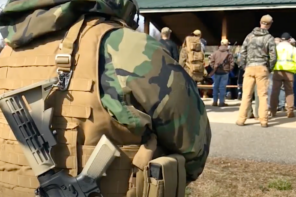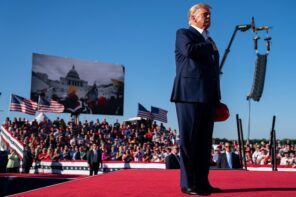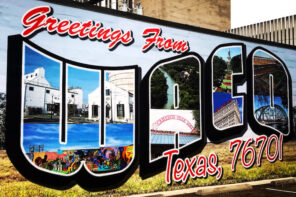No one has yet stepped out of the shadows to claim credit for the horrific bomb attacks on the Boston marathon Monday that killed three and seriously injured over a hundred. But rumors abound.
Most of the suspicions point toward right-wing extremist Christian Patriot groups. They are exactly the kind of movement that might be attracted to make its mark on a liberal anti-gun crowd on what many have noted is Massachusetts’ Patriots’ Day. The 26-mile course of the marathon was meant to honor the 26 victims of the Newtown school shooting, with a different victim recognized at each mile marker.
Massachusetts, like Connecticut and several other New England states, has recently enacted tougher gun legislation and its representatives are strong supporters of the pending Congressional gun-reform laws strengthening background checks for gun purchases. So it would not be surprising if someone like the gun-loving Hutaree militia group or a lone Timothy McVeigh (whose bombing of the Oklahoma City federal building took place two days after Patriots’ Day in 1995) were found to have been involved.
Groups like this have been on the rise since the election of President Barack Obama, and even more so since his reelection. According to a report issued by the reliable Southern Poverty Law Center last year, the number of extremist Patriot groups has skyrocketed. Only 149 groups existed before Obama was elected in 2008. In 2012 the number had expanded to 1,360. Not all are plotting terrorist attacks, of course. But some are. In September 2012, Daryl Johnson, a terrorist analyst for the US Department of Homeland Security testified before a Senate committee that there was an “upsurge” of potentially violent non-Islamic extremist activity in the United States.
So fingers point toward right-wing Christian extremists. But the fingers could be wrong. The culprits may turn out to be jihadis or simply deranged individuals, such as the sad young man who carried out the attacks in Newtown. We will have to wait and see.
The disconcerting thing is that we may wait and never find out. This could be yet again a case of terrorism for which no one claims public credit. After all, Timothy McVeigh did not plan to be caught. Only a series of coincidences led to his capture.
But why would terrorists go to the trouble (for them) and the awful experience (for us) to commit a horrendous act of terrorism and not take credit for it? Wouldn’t they want everyone to know what cause was being promoted?
Not necessarily. Anonymous terrorism is actually fairly common. In my own studies of terrorism related to religion, I have found that many if not most of the perpetrators do not make any public statement following the act.
Part of the reason, of course, is that they do not want to say anything that might help authorities locate them and bring them to justice. The manifesto of the Unabomber contained a sufficient number of clues to his identity that eventually someone—his own brother—recognized the familiar writing patterns and revealed his identity to the authorities.
But there is another reason for the anonymity: the perpetrators want the acts to speak for themselves.
If one regards acts of terrorism as a kind of performance violence, one can accept the notion that the act itself is the point. A terrorist event is like street theater, meant to draw the witnesses—and all of us who witness it vicariously through television, internet, and other media—into the reality of cosmic war that the perpetrators themselves imagine. They want us to see the world the way they see it: not normal, not business as usual, but a world at war.
Sadly, they are to some extent successful. To the degree that we are frightened and disturbed by their terrorist acts, and approach normal life with fear—even something as joyous and life-affirming as a marathon race—we have been forced into their perception of a life in cosmic war.
It is important for authorities to continue to try to track down the culprits of the Boston marathon attack, whoever and wherever they are, and bring them to justice. But meanwhile, I suggest, we should not let them win. We should let life, and marathon races, run on.




